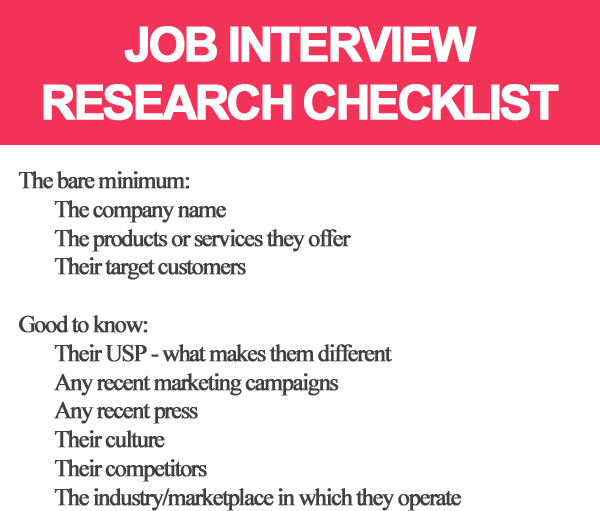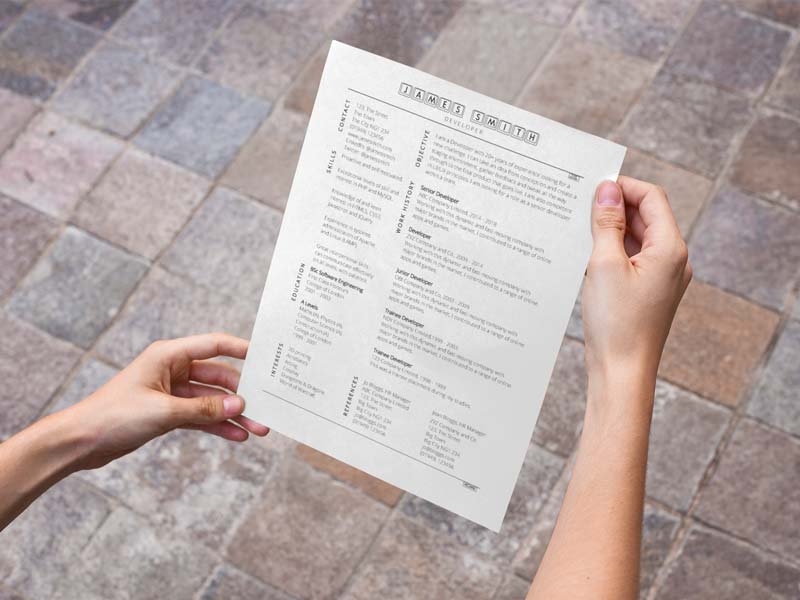Having a fantastic CV is only the first part of a two step process, and now that you’ve made it to the interview stage there is still a lot of work to be done. Not everybody is confident about giving a great interview and one of the best ways to raise your confidence is to be well prepared in advance.
Motivated, passionate, confident and prepared, are all the traits required to give a great interview and can only be achieved through research and preparation well in advance. But how do you prepare for a job interview?
Follow our guide to help you prepare for that all important job interview and give yourself the very best opportunity of success.
Conduct research

Get to know the company you’ve applied to, before the interview.
Someone who is well equipped to give a great interview is someone who has done extensive research into the role and the company. You need to understand as many aspects of the company as possible, and not only focus upon the role or the department you may end up working in.
Focusing solely upon the role will certainly give you an advantage, but understanding how the company functions, getting to know how your department connects to other teams, finding out what the goals of the company are, etc – are all vital pieces of information to have if you want to impress in an interview.
An employer is typically looking for someone who not only cares about the job they are applying for, but whom also cares greatly about the company and where they are heading. Having that overall knowledge and building up and understanding of the company’s vision and culture cannot fail to impress in an interview, and in some cases may even come as a surprise to the interviewers.
Most companies have their own website, so that would be a great place to start. Try to figure out exactly who their customers are, what product or service they are selling, and what their goals for the future are. Do they have a mission statement? What are the company’s values?
When it comes to that actual tasks and responsibilities the role will require you to carry out, the job advert is usually the best place to conduct that particular research. If you are familiar with the role and have some experience, then you should still scrutinise the list of requirements from the job advert taking note of specific jargon, keywords and phrases that the company uses.
No two jobs are ever the same, and even if you are applying for what you believe to be the exact same job because the titles match, don’t be fooled into thinking you know all there is to know. Every company sees things differently, and it’s your task to get to the bottom of what makes them tick and what they expect to see you deliver in that role.

Examine the skills, qualifications and experience required

Make sure you know exactly what the employer is looking for.
Having clearly highlighted the right skills on your CV you should also look to delve much deeper into what is likely to be discussed during the interview. Analysing the job description is the best way to build up a good amount of knowledge to be able to speak confidently and accurately about the daily tasks during the interview. Any vague answer you give about what’s required could lead the employer to believe you are not passionate about the role, and will only serve to make things more difficult when being questioned.
Your CV was the first step in showing the employer that you are the right person for the job. The interview stage will now give the employer the chance to find out what you really know so be prepared to answer questions about those skills and qualifications. The employer is going to what to find out if you are aware of how your current skill set will benefit them, and although you may have highlighted the relevant skills on your CV it will be the interviewer’s job to question you on those skills and how they will fit into their company.
You may have certain IT qualifications and skills present on your CV that match what has been requested in the job advert, but there is always much more to discuss. Your research of the role and the company will allow you to grasp how those particular skills and qualifications will be applied to the role, and will give you a great platform with which to answer more detailed questions.
One of the most important aspects an employer looks for is experience. Potentially hiring someone that has experience in the same or similar job will mean less training and a quicker route to blending in with the role and the team. If you have this experience already then the employer is going to be keen to find out more during the interview.
Don’t simply rely on your years of experience in the role or industry to get you by during the interview, and instead prepare your thoughts and answers in advance of how this experience will instantly benefit the employer. Don’t be afraid to showcase this experience during the interview, and make it clear you know what you’re talking about and how this experience is going to have a positive effect on the role if you’re successful.
Prepare your answers

Prepare answers to questions you are likely to be asked.
One of the best ways to overcome those interview nerves is to consider the questions you may be asked and prepare answers in advance. Having the ability to quickly reel off an answer confidently and correctly to any question asked during the interview will give you a huge advantage. It doesn’t matter how skilled and experienced you are for the role if you are unable to answer promptly and provide well constructed and knowledgeable answers. You will leave a big seed of doubt in the employer’s mind if your answers are vague or inaccurate.
Although it’s impossible to know exactly what you’ll be asked during the interview, there are always some obvious questions that are typically asked. By creating your own list of questions you are very likely to find that you are quite close to what happens in the interview. It doesn’t matter if the question is worded differently if you’ve already prepared an answer for something similar. This is also a great way to practice how you are going to deliver your answers, so even if you don’t quite get the questions right you will find that the practice beforehand has made it easier for you to think on the fly and improvise quickly instead of being unsure of what to say or how to phrase it.
An interviewer will be well aware that some of the questions they ask will be difficult to answer, so they are also looking to see how you handle the pressure of the situation and how quickly you can think on your feet. Don’t ever make up an answer as this could lead to you saying something very off topic, so instead you should take your time and deliver an answer that you believe is as good as you can give under the circumstances. Be brave and remember that your best answer is better than no answer at all!
Giving a scripted answer during the interview will likely sound quite robotic and unnatural, and although it’s better to be prepared than not you also need to consider how it will come across to the employer. A much better way to approach this is to bullet point your answers on paper, and don’t worry too much about the exact wording of your answer.
Suggested: Common job interview questions
Practice your answers

Practice the interview with a friend or family member.
Whether you want to use a friend or family member, sit in front of a mirror or just stare at a wall, either way you need to practice delivering your answers. Now you have a list of possible questions and you’ve bullet pointed your answers, you should now practice speaking those answers – another great way to remain confident during the interview!
Most people often find that they can give a good flowing answer by having that knowledge of what they want to discuss already lodged in their memory, so have a look at your prepared answers and then attempt to construct an answer. Each time you do this you will find that the wording is different – which is a good thing. Again, you want to stay away from a scripted answer and instead learn how to cover all the points you’ve already decided upon no matter how the question is asked.
One of the most likely questions to be asked during an interview relates to your strengths and weaknesses. When asked this type of question most people tend to sway towards trying to put a positive spin upon their weaknesses almost to the point that they are not actually a weakness at all, and this is a very dangerous way of answering.
An employer doesn’t want to sit across from someone who believes they are perfect and have no weaknesses at all and instead want to see some honesty and how those weaknesses are being dealt with and developed upon. You shouldn’t of course self deprecate but you can however be honest and give your view of how you can overcome those weaknesses, what you’ve been doing to improve upon those weaknesses, and what you are going to continue to do in order to overcome them.
Have a copy of your CV ready

Pictured above: Developer CV template
Sometimes the person or persons conducting the interview won’t have a copy of your CV in front of them. This is because someone else – such as a HR Manager or Assistant – has filtered through all the applications and come up with a shortlist without passing on these details.
Other times, you’ll be interviewed by a panel and only one copy of the CV will be available.
For times like this and a multitude of other scenarios that you simply cannot plan for, it’s worth taking several clean copies of your CV with you, in case the employer asks to see it.
Of course, if for any reason your CV wasn’t completely up to date, you should always take an up-to-date version with you to the interview.
It is also helpful to have your CV in front of you to refer to as naturally you may feel nervous on the day, although you should avoid reading from it.
Finally, if your CV includes a lot of stats (such as sales figures achieved), you can refer the employer to these during the interview. For example, you might say “As you’ll see from page 2 of my CV, I exceeded my sales targets at XYZ Sales & Co every year for the 7 years I was employed there”, where page 2 of your CV gives the actual figures in more detail.
We also recommend…
…these 10 tips on how to crush any job interview from men’s grooming, style, fitness and lifestyle expert, Aaron Marino:
“The future depends on what you do today.” ~ Mahatma Gandhi
